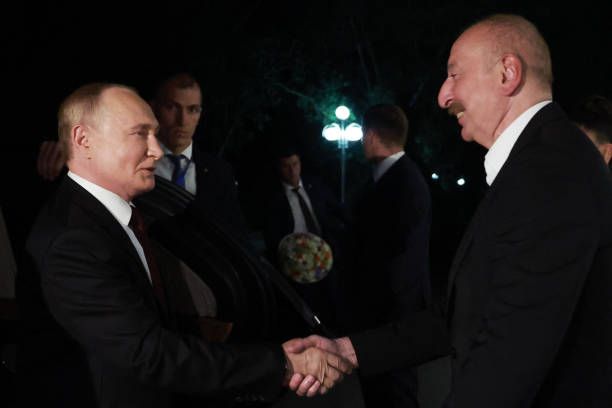Russian President Vladimir Putin visited Baku for talks with his Azerbaijani counterpart Ilham Aliyev, marking his first visit since the invasion of Ukraine in February 2022. The discussions are expected to focus on strengthening relations with Azerbaijan, a historically aligned nation that has recently signed deals with European countries for gas imports. Azerbaijan has been extending its oil exports to Europe, with countries like Slovenia receiving natural gas from Azerbaijan. This move comes as European countries seek to diversify away from Russian energy supplies. The talks also aim to address concerns within the Collective Security Treaty Organization (CSTO) as relations with Armenia deteriorate.
Armenia, which has traditionally been close with Russia, has strained relations with Moscow, accusing it of being an unreliable partner. This follows conflicts between Nagorno-Karabakh and Azerbaijan from 2020 to 2023, where Russian “peacekeepers” did not intervene, leading to Armenia’s dissatisfaction. After losing control of Nagorno-Karabakh to Azerbaijan in 2023, Armenia has considered applying for EU membership and has conducted military exercises with the United States. The country continues to distance itself from Russia and the CSTO. In contrast, Azerbaijan has maintained good ties with Ukraine, providing humanitarian aid while also signing a political and military agreement with Russia just before the invasion of Ukraine.
The talks between Putin and Aliyev will likely include discussions on new cooperation in the oil sector, as well as addressing the unity of the CSTO amid tensions with Armenia. The visit comes as European countries seek alternative energy sources, diversifying away from Russian supplies. Azerbaijan’s willingness to work with Europe and Ukraine for gas exports reflects this shift in energy dynamics. Despite its alignment with Russia, Azerbaijan has also shown support for Ukraine, providing aid while maintaining political and military ties with Russia. The geopolitical landscape in the region is evolving as countries navigate complex alliances and energy partnerships.
The situation in the region is further complicated by ongoing conflicts and territorial disputes, such as the Nagorno-Karabakh conflict between Armenia and Azerbaijan. Russia’s role as a key player in the region adds another layer of complexity to the dynamics between countries. As Armenia considers closer ties with the EU and the US, and Azerbaijan navigates relationships with Russia, Europe, and Ukraine, the geopolitical balance in the South Caucasus is shifting. The outcome of the talks between Putin and Aliyev will have implications for the region’s energy security, political alliances, and future relations with key players in the international arena.
Overall, the visit of Putin to Baku underscores the shifting dynamics in the South Caucasus region, with countries like Azerbaijan diversifying their energy partnerships and seeking closer ties with European countries. The discussions between Russia and Azerbaijan will shape the future of the region’s security arrangements and geopolitical alliances. As tensions simmer between Armenia and Russia, and Azerbaijan maintains a delicate balance between supporting Ukraine and maintaining relations with Russia, the outcome of the talks will have ripple effects on the wider region. The evolving landscape in the South Caucasus highlights the challenges and opportunities for countries in navigating complex geopolitical relationships amidst shifting energy dynamics and regional conflicts.














